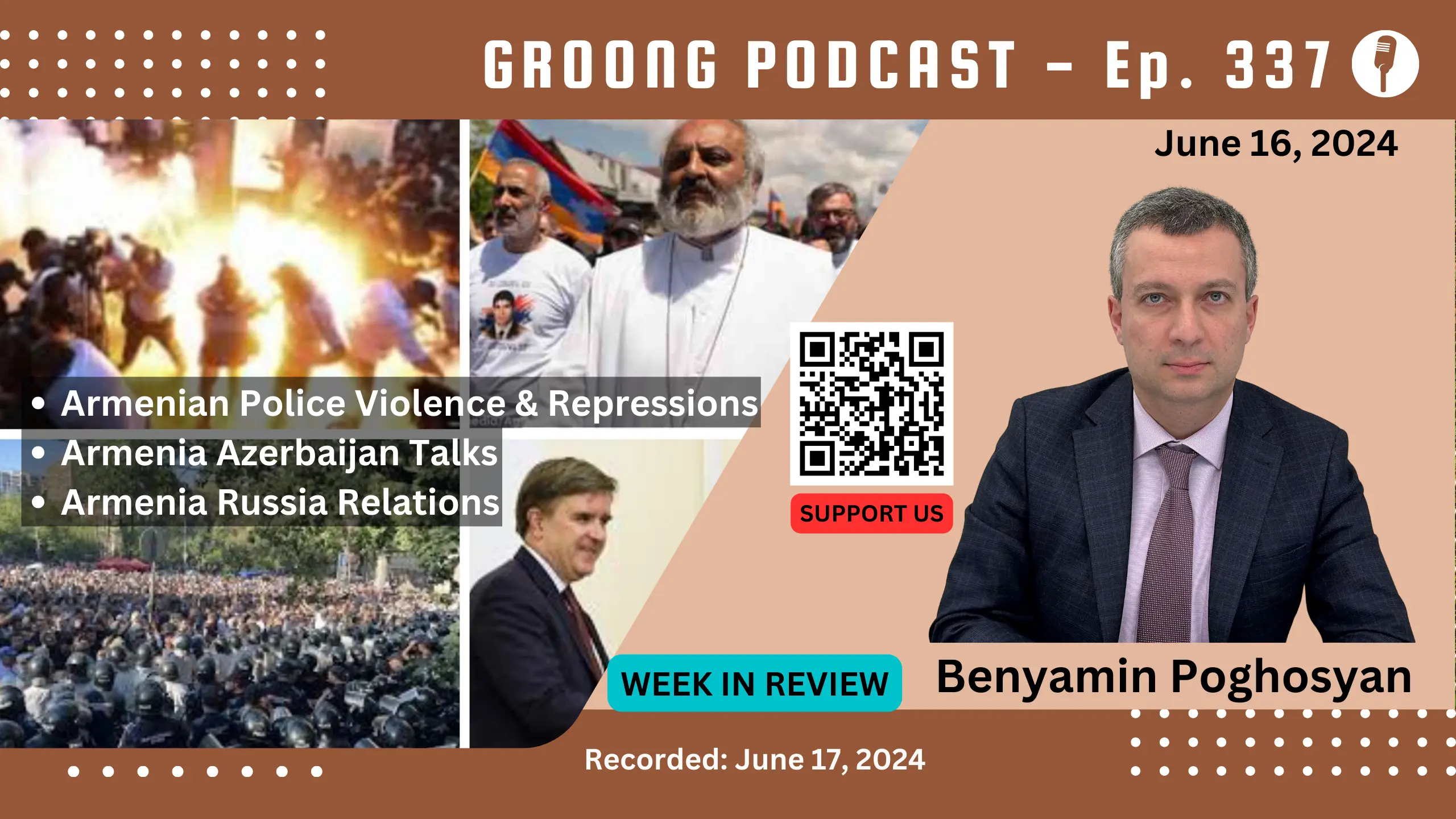
Groong Links:
Guest:
Topics:
- Police Brutality, Violence & Repressions
- Armenia Azerbaijan Talks
- Armenia Russia Relations
Episode 337 | Recorded: June 17, 2024
Show Notes
Police Violence and Repressions
June 12 came and went. It was billed as a sort of culminating point and the date when Bagrat Srbazan’s assurances, that he needed 96 hours to remove Pashinyan, expired.
It proved to be a bloody day. On that day, the Pashinyan regime proved that they’re willing to use unprecedented force to suppress the protesters. Up to a hundred people sought medical attention after the police lobbed dozens of stun grenades at the protesters, many of them protesters.
NOTE: It’s important to highlight that the stun grenades that were used are reported to produce noise greater than 170dB, which can instantly cause permanent hearing damage.
Today (June 17) there was another protest, on the occasion of the hearing in parliament that Bagrat Srbazan had demanded, in order to send a demand to Pashinyan for resignation. As promised, Civil Contract deputies boycotted the session triggering quorum failure.
Questions:
- What next in the movement?
- Any announcements from Bagrat Srbazan yet on continuing the movement?
The US Embassy’s response to the beating and injury of protesters on June 12 was to emphasize that protesters should “eschew violence”. Only after that do they also ask the police to refrain from violence, when this was chiefly a problem of disproportionate use of force by the police. According to various accounts, 25-30 stun grenades were fired.
Question:
- What was the reason for such a strong show of support?
June 12 was not the end of it. Over the weekend, Pashinyan’s government launched a series of repressions. More than a dozen members of the ARF were arrested. After the head of the ride-sharing company GG issued a call to join the protests, the offices of GG were raided and all computers were confiscated.
Question:
- Add to this the arrest of Artsakh mayors and the practice of arresting active protest participants for at least 72 hours and then letting them go without charges, does this indicate an over-reliance on brute force to suppress protesters? Is this a strategy that can work long-term for Pashinyan?
Armenia Azerbaijan Talks
After the most recent war of words between Armenian and Azeri authorities about demands to change the Armenian constitution, or apologize for the so-called “Khojali genocide”, and for the two countries to apply together to annul the OSCE Minsk Group together, the State Department’s man to the South Caucasus, James O’Brien, and other high level officials were in Yerevan this past week for high level meetings, as well as for delicious dolma (in their own words).
Question:
- What were the key reasons for O’Brien’s trip to Yerevan? Why is there so much US attention on Armenia, and why now?
Azeri media talks about the so-called “Zangezur Corridor” as a fait-accompli, and claim that the US and the west are currently pressuring Armenia to open the extraterritorial corridor to meet their interests.
Questions:
- What’s the status of that issue within the Armenian-Azerbaijani talks? And what are the key differences between Aliyev’s “corridor” through Armenia and Pashinyan’s “crossroads of peace”?
- What are the interests of the west, in this issue?
- Within 2 weeks there will be presidential elections in Iran. Do you foresee any shifts in Iranian policy and their red lines regarding Armenia’s territorial integrity and Azerbaijan’s demands for corridors?
Armenia - Russia Relations
Pashinyan continued on his anti-CSTO theme this week. Previously he had alleged, without clarifying any details, that 2 CSTO countries actively helped Azerbaijan before and during the 2020 war.
This week, he continued ranting against the CSTO by highlighting the pro-Azerbaijani role that Belarus has played since before the 44-day war. He vowed that as long as Lukashenko is president, neither he nor any Armenian official will visit Belarus.
The two countries also recalled their respective ambassadors for consultations”.
Questions:
- Did Pashinyan just wake up and realize that Belarus has been supplying weapons to Azerbaijan?
- Is this treatment also going to apply to Israel? Turkey? Hungary? Bulgaria? Slovakia? Italy?
- How about THE UNITED STATES, who by the way provided a significant amount of military equipment to Azerbaijan for free (ostensibly to counter Iran)?
- What’s really behind this emotional tirade from Pashinyan?
Ukraine Summit in Switzerland
The Ukraine “Peace Summit” in Switzerland is over. The organizers present it as a success, despite Russia, one of the main warring parties, not being present and rejecting the conference. Ten countries, including some major ones such as India and Brazil refused to sign the final declaration. What’s even more interesting is that Armenia is also one of those ten countries!
The full list of abstaining countries: Armenia, Brazil, Slovakia, India, Mexico, Saudi Arabia, Thailand, South Africa, and the UAE did not sign the final declaration.
Questions:
- Why did Armenia attend this summit, and what was the cause for this apparent caution by Pashinyan?
- Did this summit bring the world closer to ending the war in Ukraine?
- At the same time, Putin stated his conditions for ending the war in Ukraine. Does that bring us any closer to ending the conflict?
Thoughts from Participants
- Hovik: June 12th police violent attacks against journalists and the media, and again western government silence in the face of it.
- Benyamin: Pashinyan’s counter logical, ahistorical “Real Armenia” vs “Historical Armenia” argument.
Wrap-up
That’s our Week in Review, we hope you found it helpful. We invite your feedback and your suggestions, you can find us on most social media and podcast platforms. Thanks to Laura Osborn for the music on our podcasts.
Guests

Benyamin Poghosyan
Dr. Benyamin Poghosyan is a Senior Research Fellow at APRI Armenia, a Yerevan based think tank,and the Chairman of the Center for Political and Economic Strategic Studies. He has served as the vice president for research and head of the Institute for National Strategic Studies at the National Defense Research University in Armenia. Dr. Poghosyan was a Distinguished Research Fellow at the US National Defense University College of International Security Affairs. He is a graduate from the US State Department Study of the US Institutes for Scholars 2012 Program on US National Security Policy Making. He holds a PhD in history and is a graduate from the 2006 Tavitian Program on International Relations at Fletcher School of Law and Diplomacy.
Hosts

Asbed Bedrossian
Asbed Bedrossian is an IT professional, and for years oversaw the central IT enterprise infrastructure and services at USC. His decades of experience spanned across IT strategy, enterprise architecture, infrastructure, cybersecurity, enterprise applications, data center operations, high performance computing, ITSM, ITPM, and more.
Asbed founded the Armenian News Network Groong circa 1989/1990, and co-founded the ANN/Groong podcast in 2020.

Hovik Manucharyan
Hovik Manucharyan is an information security engineer who moved from Seattle to Armenia in 2022. He co-founded the ANN/Groong podcast in 2020 and has been a contributor to Groong News since the late 1990s.
Disclaimer: The views expressed by Hovik Manucharyan on the ANN/Groong podcast are his own and do not necessarily reflect the opinions of his employer or any other organization.